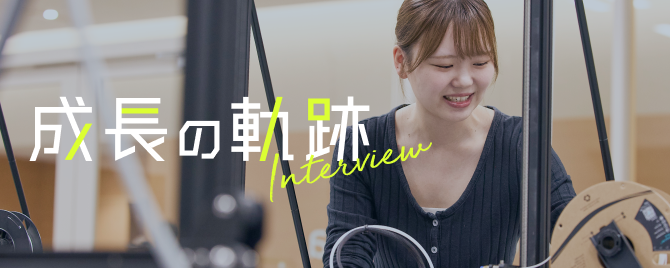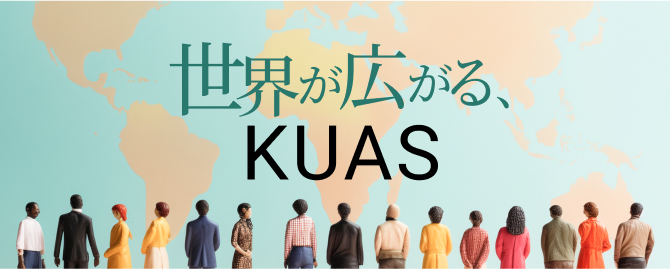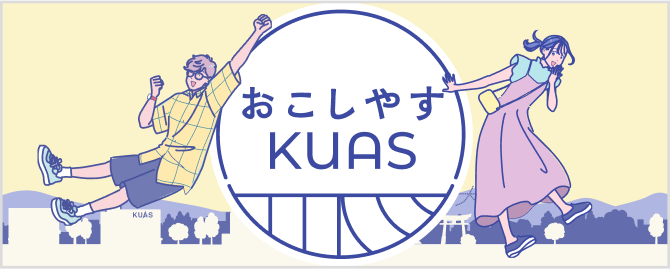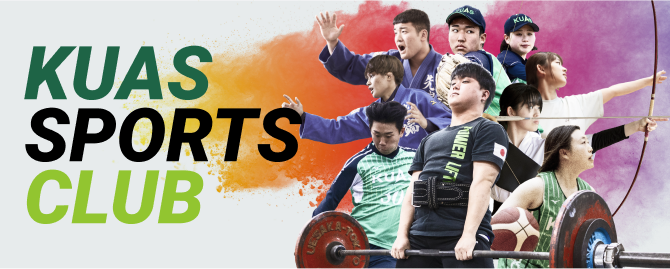Founding Principles・Three Policies

Founding Principles
In 2018, our university embarked on a major reformation. In 2019, these reforms accelerated even further as we changed our name to Kyoto University of Advanced Science (Nagamori Gakuen Educational Foundation). To mark this major milestone in our university’s history, KUAS has taken a fresh look at its core mission and established a new set of founding principles.
- KUAS will seek to produce outstanding graduates who can identify and solve the problems of the future.
- KUAS will seek to envision a brighter future for society and conduct advanced academic research that will lead to the realization of that vision.
- By producing excellent graduates and research, KUAS will take a leading role in contributing to society, both today and in the centuries to come.
Putting our Founding Principles into Practice
The experts and leaders who will contribute to the society of tomorrow will work in a world of diverse values.
Kyoto University of Advanced Science is committed to education and research that takes the initiative in solving global issues by looking ahead to the future, identifying new issues that may arise, and integrating these with contemporary educational themes.
At KUAS, we will seek to produce dynamic, capable people who can take on the challenge of complex and multifaceted problems by combining world-class progressive-mindedness, adaptability, and morality with specialized knowledge, creative thinking, and foresight alongside a broad, holistic foundation of knowledge.
Revised on April 1, 2019
Three Policies
Kyoto University of Advanced Science has revised its existing policies and formulated three new ones.
The Three Policies of Kyoto University of Advanced Science
Graduation Approval and Degree Awarding Policy (Diploma Policy)
- Knowledge and Understanding
- 1.1 Graduates shall acquire a specific core body of knowledge, relating it to knowledge in other fields, and use it to solve problems in a changing global society.
- Technical Skills
- 2.1 Graduates shall be able to collect and use necessary information using appropriate methods.
- 2.2 Graduates shall be able to communicate with others using a variety of languages.
- Thought, Judgment and Expression
- 3.1 Graduates shall be able to logically construct and express their own ideas through multifaceted thinking by utilizing acquired knowledge, skills, and experience.
- 3.2 Graduates shall be able to critically examine a topic of their own choosing, while objectively analyzing any information collected.
- Interest, Motivation and Attitude
- 4.1 Graduates shall demonstrate an ongoing interest in the problems of a changing global society and be able to act proactively and persistently to solve those problems.
- 4.2 Graduates shall be able to act as an autonomous member of society while collaborating with others from diverse backgrounds
Curriculum Development and Implementation Policy (Curriculum Policy)
- Educational Curriculum
- 1.1 The curriculum shall consist of core subjects common to all universities and specialized subjects in each department.
- 1.2 The common core subjects shall be designed to help students acquire the following core competencies: progressive mindedness, culture, basic academic skills and techniques, language skills, cross-cultural understanding, communication skills, leadership and teamwork.
- 1.3 Specialized courses shall be arranged in accordance with career paths that make the most of the academic training in each undergraduate faculty, and shall foster students’ ability to act independently and solve problems based on their specialized knowledge.
- Learning Methods and Processes
- 2.1 (Learning Method) During their four-year educational program, students shall not only learn theoretically about liberal arts subjects and specialized subjects, but also learn practically and actively through experiential learning and career learning.
- 2.2.1(Learning Process) In the university’s common core subjects, students shall learn liberal arts subjects necessary for the acquisition of general abilities in a step-by-step manner.
- 2.2.2 In the first year, students shall take start-up courses to develop their basic problem finding and solving skills and communication skills.
- 2.2.3 In the first and second years, students shall learn how to acquire basic Japanese language skills, numerical processing skills, and IT skills, and also learn to develop their communication, leadership, and cooperation skills through physical activities.
- 2.2.4 From the first year to the third year, students shall study English through a consistent curriculum with the aim of acquiring English skills that are useful for working adults.
- 2.2.5 From the second year, students shall study various issues of modern society in an interdisciplinary manner in future outlook courses, which seek to nurture students’ knowledge of the liberal arts and their ability to discover and solve problems.
- 2.3 (Learning Process) In specialized courses, students shall learn step-by-step in courses and programs established by each faculty and department in order to acquire the ability to act independently and solve problems based on specialized knowledge.
- 2.1 (Learning Method) During their four-year educational program, students shall not only learn theoretically about liberal arts subjects and specialized subjects, but also learn practically and actively through experiential learning and career learning.
- Assessment of Learning Outcomes
- 3.1 Learning outcomes shall indicate the degree of achievement of the competencies specified in the Diploma Policy and the achievement goals set for each subject in the curriculum. Learning outcomes shall be evaluated in various ways according to the assessment policy.
- 3.2 The contents of each course, as well as its achievement objectives and evaluation methods and standards, shall be shown in the syllabus, and the degree of achievement of the achievement objectives shall be evaluated.
Admission Policy
In the founding spirit of KUAS, the purpose of education at our university shall be to nurture “top-notch professionals who can identify and solve problems the problems of the future. To this end, KUAS seeks applicants who understand the educational content of the faculty and department of their choice, and who are motivated to explore and practice academics, improve their skills, and acquire the civic education necessary to succeed in a global society.
- Knowledge and Skills
- Applicants shall possess the basic knowledge and skills of subjects taken in high school.
- Thought, Judgment and Expression
- Applicants shall have the ability to think and make judgments about disciplines related to science, culture, society, nature, health, and other topics as well as be able to express their own ideas.
- Positive attitude toward learning by taking initiative and collaborating with diverse people
- Applicants shall have a strong interest in learning and skills, and a strong desire to learn independently.
- Applicants shall able to work collaboratively with diverse people to acquire knowledge and skills.
- Applicants shall the desire to become culture and international as well as improve their language skills, particularly their English skills.
The Three Policies of the Kyoto University of Advanced Science Graduate School
Graduation Approval and Degree Awarding Policy (Diploma Policy)
Degrees shall be awarded to those who have acquired the knowledge necessary to work as academic researchers and highly specialized professionals in their respective fields of study.
Curriculum Development and Implementation Policy (Curriculum Policy)
Curriculums shall be organized so that students can acquire outstanding academic knowledge and applied skills in each research field.
Admission Policy
KUAS shall seek individuals who are highly motivated to contribute to society through the acquisition of advanced knowledge and skills in their respective fields of study.




